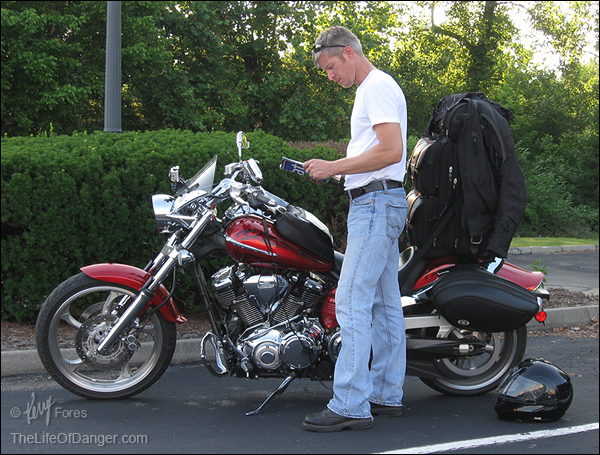The Linen-Covered Table at a Rest Area
Tar-filled expansion cracks were beating a monotonous rhythm on the tires of the Raider. The hum of tires on the rough-textured concrete filled the space between the steady beats with a white noise that grew louder with each mile, and the miles were passing at more than one per minute. The air rushing around my helmet improvised an accompaniment of sporadic whistles but gave no relief from the heat that settles in the valleys of the Blue Ridge Mountains in July. What little skin remained exposed to the sun through gaps in my protective gear had turned uncomfortably pink but had no way to take shelter.
A rest area carved into a mountainside at great expense invited me to stop. I parked my motorcycle in a parking spot dotted with puddles of water and oil, removed my helmet, and let my ears drink in the relative silence. I removed the dark, heavy layers of my protective gear, stacked them on the bike, and entrusted their safety to the goodwill of fellow travelers.
Taking a break from the road.
White tents, the kind that bloom at outdoor farmer markets and art shows, were pitched in the shaded grass near a walkway that ushered travelers from their vehicles to the restrooms and vending machines. A local chapter of the Vietnam Veterans Association had a cookout in progress and patriotic items were also available for purchase. A little girl grabbed a small American flag off a table and her mother quickly replaced it while taking her hand and hurrying her to the restroom. A tent sheltered a round table draped in white linen. It was carefully prepared with five place settings for distinguished guests the organizer knew would not attend. Had the President of the United States shown up, no place setting would have been added to accommodate even him.
Instead of purchasing a drink from a vending machine I plunged my sunburned wrist into an ice-filled cooler, let it linger in the soothing ice water, and brought up a Mountain Dew. As I extended a $5.00 bill toward a grey-haired man behind the table he asked me if I had served. "Yes, I was in the Air Force, but there were no conflicts during my service," I replied, somewhat apologetically.
"That's not what I asked," he responded quietly and respectfully, "I asked you if you served. When you enlisted you didn't tell them you only wanted to serve in Hawaii, in peacetime. You may have signed up in peacetime but you had no idea what was to come. Here,” he said, pulling an empty lawn chair nearer him under the extended limbs of grand Oak tree, “have a seat.”
This man—either I never asked his name or he never gave it— was blown up in Vietnam. Shredded metal, dirt, and his buddy’s body parts penetrated his body in the unimaginably short moment it takes violence to destroy a life. That, he said, was the easy part. What followed was over a year in a veteran’s hospital in Ohio learning to walk again, and dealing with having lived when his friends died. It was a year struggling to be the man and provider he was suppose to be for his family; a task he was rendered physically and mentally incapable of performing in that life-shredding instant in a place called Vietnam.
After his discharge from the hospital he returned to his hometown to reclaim the job he held before enlisting; the job he had been guaranteed he could return to. But when he removed his shirt during the pre-employment physical, exposing his scars, his job evaporated.
“Because they were a family they knew the telltale signs of trouble, they new the anniversaries to remember - but not the anniversaries Hallmark writes cards for.”
Unable to support his wife, young son and daughter through the local economy—and on the verge of losing everything—he traveled east, alone, to explore two job opportunities he learned of through the Veterans Administration. The first, as an electrician's helper, was offered to him and he took it even before taking the second interview.
Vietnam followed him to the east coast even if his family hadn't. The ghosts, pain, and habits that also tagged along proved to be bad company. Drugs and alcohol numbed both the physical and mental pain but, as he saw himself spiral down, he sought treatment and successfully beat both addictions. Work—excessive work—kept him away from alcohol and pill bottles and kept his thoughts out of Vietnam but also kept him away from his family. In time his wife left him and his kids turned their back on him. His mother, father, and siblings also deserted him while he struggled with his demons and addictions. Unless they’d had their best friend’s bones tear through their body in the muck of a mostly-unheard of country there was no way for them to understand. And there was no way for him to explain.
He remained clean and his hard work eventually earned him a Master Electrician rating, yet he was alone.
In time he became involved with the Vietnam Veterans Association and through that he found brothers and sisters. He found a family. As bad as he had it, he found others who had it much worse. Because they were a family, a family spawned by war, they knew the telltale signs of trouble and they new the anniversaries to remember; but not the anniversaries Hallmark writes cards for. June 8th is approaching; it's time to give Walter a call. On June 8th of a year distant on the calendar but immediate in memory, Walter’s chopper was shot down and he spent thirty hours in an on-again off-again firefight listening to friends die, wondering if he was next. January 20th is a bad time for "Spooky." He was 15,000 miles away from the U.S. fighting for something no one understood, counting the days until he'd return home to his girl, Connie. She was his hope. Some soldiers clung to crosses; he clung to Connie. But the mail he received on January 20th landed in his life like an artillery shell. The girl he meant to marry had met someone new. Spooky volunteered for every patrol and he volunteered to lead them. He survived. He didn't mean to. His scars are invisible but disabling.
As a family they cooked together and shared meals, they drove each other to appointments, dialysis, and physical therapy. They sat silently with friends on the bad days to keep ugly thoughts from running amuck. And they sat in highway rest areas on holiday weekends to maintain awareness of the prices paid—physically, mentally, by choice, or by conscription—so more traditional families could spend the weekend at the beach, or camp in the woods, concerned only of their sunburned skin or that rain may douse their cook-out.
We sat in silence for a while and then he told me his daughter was still outside his life but his son, having served three tours in Afghanistan, sent him a letter in the not-so distant past that said, "Dad, I understand now." That relationship was healing.
My Mountain Dew was gone. The shade had cooled my body. My ears were rested. My heart ached some and my vision was a bit blurry. The $5.00 I had pulled out for the Mountain Dew was slipped secretly into the donation box. Secretly, or it would have been refused by him for he saw my unscarred body and peacetime service as being equal to his own service. I had put on the uniform, just as he had, and that was all that mattered to him. I was family.
On my way back to the bike I paused at the tent that had been so carefully prepared for dinner guests that could never attend. Five place settings, one for each branch of service, surrounded a centerpiece comprised of an American flag, Holy Bible, and a single red rose. Dress caps from each branch of service covered the plates and the chairs were draped with POW-MIA flags. I took a long, thoughtful look and reflected on the stories that could never be told around that table. I got back on my motorcycle with a new perspective and continued my ride to the beaches of North Carolina, where I would gratefully spend a long holiday weekend with one of my daughters.
A linen-covered table carefully prepared for guests whom could not attend.
This story was published in the Winter 2015 edition of Planes, Dames, and Automobiles magazine.




